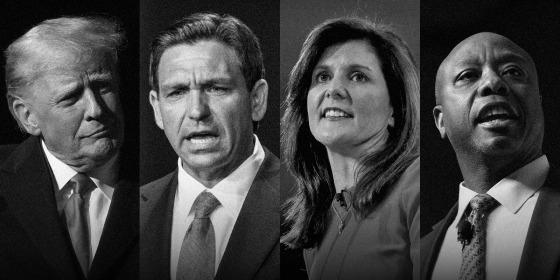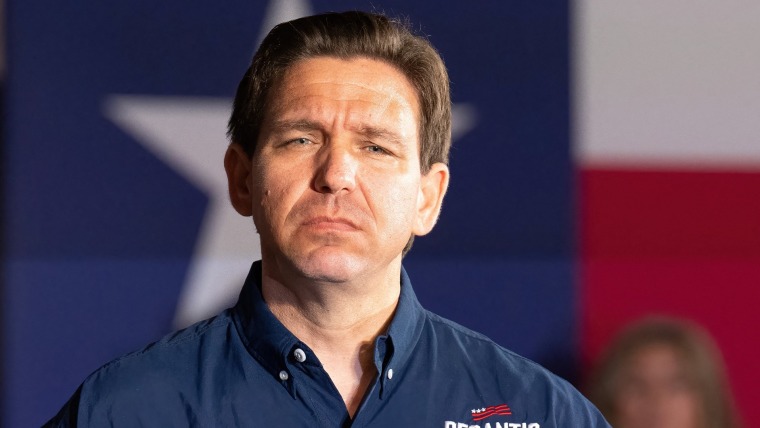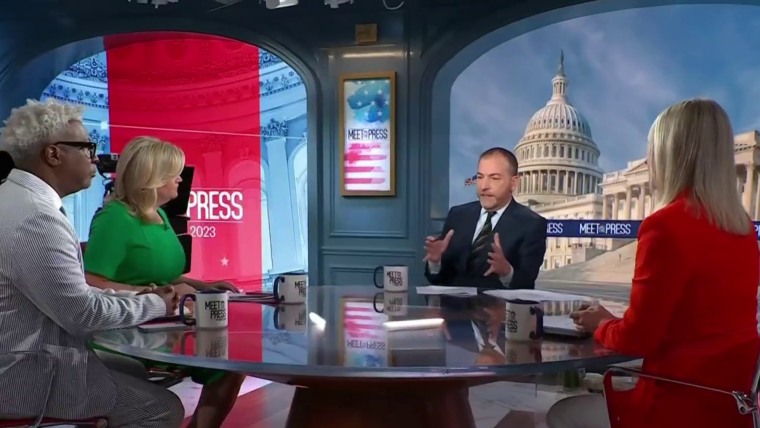WASHINGTON — Florida Gov. Ron DeSantis tapped out top donors and burned through $7.9 million in his first six weeks as a presidential candidate, according to an NBC News analysis of his new campaign finance disclosure.
The numbers suggest, for the first time, that solvency could be a threat to DeSantis’ campaign, which has touted its fundraising ability as a key measure of viability. They reflect the broader reality that DeSantis stalled after his launch: polling ahead of the Republican primary pack but far behind former President Donald Trump.
In another sign of the financial strain on the campaign, DeSantis has fired a dozen staffers in what a source familiar with the move described as a cost-cutting measure, NBC News reported Saturday evening.
The irony for DeSantis is that he raised a total of $20.1 million between mid-May and the end of June, easily ahead of other Republican candidates — even Trump, whose campaign raised $17.7 million from April through June, though Trump's campaign committee did end the quarter with twice as much money to spend as DeSantis.
But more than two-thirds of DeSantis’ money — nearly $14 million — came from donors who gave the legal maximum and cannot donate again, NBC’s analysis shows. Some of those donors gave the $3,300 limit for both the primary and general election, boosting DeSantis’ totals with cash that can’t be used to try to defeat Trump.
DeSantis finished June with more than $12.2 million in the bank, but his filing indicates that $3 million of that can only be used in the general election. Trump’s campaign ended the quarter with $22.5 million on hand.
At the same time, DeSantis spent about 40% of what he raised, in part by paying salaries to 92 people (before the staff firings). That gave him by far the biggest staff footprint of the GOP presidential candidates but also left him with the question of how he can sustain his payroll — or anything close to it — without finding new sources of revenue. Already, he is struggling to keep high-profile supporters on board.
DeSantis does have a financial edge no one else can match in the form of his super PAC, which can accept donations of unlimited size and has already taken in $130 million. But keeping a campaign humming on smaller donations can be a different matter entirely.
More broadly, Saturday’s second-quarter campaign finance filing deadline showed the challenge that each of Trump’s rivals has in trying to wrest the nomination from him at a time when about half of GOP primary voters say he is their top choice.
No other Republicans raised more than $6 million from donors into their campaign accounts, with North Dakota Gov. Doug Burgum and entrepreneur Vivek Ramaswamy exceeding that number only by tapping their own personal wealth.
South Carolina Sen. Tim Scott’s campaign raised almost $5.9 million, while former Ambassador to the United Nations Nikki Haley’s campaign raised $5.3 million. And two candidates who waited until June to jump in posted lower numbers: Former New Jersey Gov. Chris Christie raised $1.7 million and former Vice President Mike Pence raised $1.2 million.
Their reports show a presidential field largely reluctant to invest in staffing and other major campaign expenditures, candidates having difficulty tapping small-dollar donors for big returns, and a handful of candidates already in danger of missing the Republican National Committee’s first debate. Here’s what else we saw in the second-quarter finances.
Small campaign staffs stand out in the early going
DeSantis stands out among those who have filed their reports in having the largest campaign staff — by a mile. His 92 staffers on payroll are well above the next-largest campaign so far.
Scott reported 54 campaign staffers while Trump reported 40. Ramaswamy listed 27 people on his payroll, and Haley had 22. Former Arkasnas Gov. Asa Hutchinson had six people on staff.
Other campaigns were operating on a shoestring budget. Conservative talk radio host Larry Elder had one campaign staffer, while former Vice President Mike Pence, former New Jersey Gov. Chris Christie, former Texas GOP Rep. Will Hurd and Miami Mayor Francis Suarez did not list anyone on their payrolls as of June 30.
Debate qualification already looking tricky for some
The reports also show how difficult it may be for many of the lower-polling candidates to hit the Republican National Committee’s 40,000-donor threshold to qualify for the party’s first debate in August — let alone the polling threshold too.
Arkansas Gov. Asa Hutchinson, who raised just $580,000, said in a statement that his campaign had only 3,928 unique donors in the second quarter, as well as another 2,516 in the first 13 days of July. He needs six times that many to hit the threshold.
Miami Mayor Francis Suarez’s reports names only 352 unique donors, and he raised less than $29,000 from unitemized donors who gave less than $200. Even if every single unitemized dollar was raised from a different unique donor (which is unlikely), Suarez still wouldn’t have hit the debate threshold through June.
And former Texas Rep. Will Hurd’s report names only 193 unique donors, along with another $54,000 from unitemized donations.
Small dollar donor struggles
One of Trump’s campaign strengths has long been his appeal to small-dollar donors. The flip side of that: His challengers are not getting much small-donor help themselves right now.
DeSantis, who raised the most of Trump’s challengers in the second quarter, only saw about 14% of his total fundraising haul coming from small-dollar donors, for about $2.9 million.
Haley and Scott, who spent millions building up small-donor fundraising infrastructure before launching presidential campaigns, raised only 16% ($870,000) and 21% ($1.2 million) of their second-quarter totals from small donors, too.
Among the field of Trump challengers, former Gov. Chris Christie took in the biggest share of his total from small donors: slightly below 35%. But that still worked out to only about $571,000 of his $1.6 million haul.






